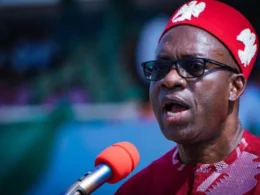According to Oyedele, the current system attributes all VAT paid by MTN to Lagos State, where the company’s headquarters is located, despite the fact that the telco’s services are consumed nationwide.
Lagos, Nigeria – The Chairman of the Presidential Fiscal Policy and Tax Reforms Committee, Taiwo Oyedele, has revealed that MTN Nigeria contributes over N200 billion monthly in Value Added Tax (VAT), positioning it as the largest VAT contributor in the country.
Oyedele made this disclosure during a panel session at Channels Television’s Town Hall on Tax Reforms, where he underscored key disparities in the current VAT allocation system and highlighted proposed reforms aimed at achieving a fairer distribution of tax revenues.
According to Oyedele, the current system attributes all VAT paid by MTN to Lagos State, where the company’s headquarters is located, despite the fact that the telco’s services are consumed nationwide.
“MTN is the largest contributor to VAT in Nigeria. In fact, they pay VAT of over N200bn every month; the gap between them and number two is huge,” Oyedele stated.
He explained that the current method disproportionately benefits Lagos State, as all VAT generated by the telecommunications giant is allocated to the state. However, he noted that the reforms propose a shift to a consumption-based VAT distribution model, which will ensure states where the revenue is generated receive a fairer share.
“Today, all the VAT paid by MTN is credited and attributed to Lagos State, even as calls are made in Kano, the FCT, Ekiti, Edo, or Kebbi,” Oyedele pointed out.
Under the proposed reforms, Lagos State — which currently retains the full N200bn VAT revenue — would see its share drop to around 20 per cent, with other states benefiting from a more equitable distribution based on consumption.
“This adjustment ensures that states where the VAT is generated get their fair share,” Oyedele explained, adding, “When you analyse the data, you see Lagos State’s share reduces slightly, but every other state gains.”
The tax reform bill seeks to address systemic inefficiencies and inequities in Nigeria’s fiscal policies, focusing on fairness in revenue allocation.
While the proposed reforms have sparked debates, with critics arguing that the changes could negatively impact some stakeholders, Oyedele dismissed these concerns, insisting that the current system is “flawed and unfair.”
“If you’re doing the wrong thing, how can Lagos State disagree with us when we propose to fix it?” he asked.
The tax committee’s proposals mark a significant step in reforming Nigeria’s VAT system to ensure that all states benefit proportionately from the revenues generated within their jurisdictions.










Join our Channel...